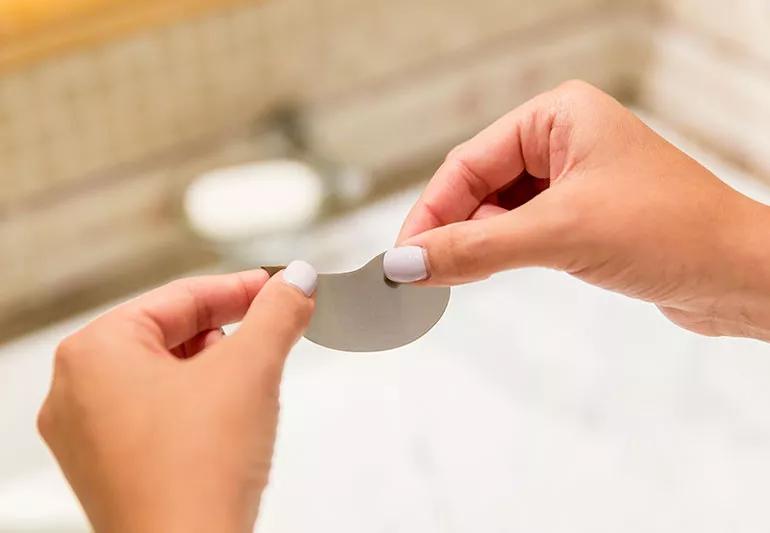User testimonials aren’t exactly backed by scientific research

Image content: This image is available to view online.
View image online (https://assets.clevelandclinic.org/transform/167b5409-9a0b-4e4f-9b27-cb3c99697ed5/HangoverPatch-1149724528-770x533-1_jpg)
Closeup of hand holding a small beige patch
It’s 5 o’clock on a Friday and a long-discussed pub crawl with friends kicks off in a few hours. Someone suggested a few breweries to check out. A trendy new bar made the must-visit list, too, along with a few old favorites.
Advertisement
Cleveland Clinic is a non-profit academic medical center. Advertising on our site helps support our mission. We do not endorse non-Cleveland Clinic products or services. Policy
The more you think of the fun night ahead, the more you realize the next morning may include a rather wicked hangover. But can that head-pounding fate be avoided by sticking a hangover patch onto your arm?
To get the answer, we turn to pharmacist Benjamin Witt, PharmD, MBA, BCPS.
Hangover patches are marketed as a remedy to that hit-by-a-truck feeling that can follow a night of imbibing. How does this magic happen? Basically, by restoring your body’s depleted nutrients through your skin.
The “patches” are basically stickers infused with gobs of healthy stuff. The list usually includes B vitamins such as thiamine (B1), niacin (B3) and cobalamin (B12) plus a host of other nutrients to help you rally.
And all you have to do to get a healthy dose of that goodness is apply the sticker to your skin an hour or so before cracking open any beer, booze or wine.
Seriously. That’s it.
While you party and for hours afterward, your skin supposedly absorbs nutrients out of the patch. This cutaneous transfer is meant to counteract some of alcohol’s rather negative effects on your body.
Think of the patch as sanding down the rough edges of a hangover to allow for a smooth recovery. Now the big question: Does it really work?
Advertisement
Let’s begin with the one definite fact: Drinking alcohol — especially too much alcohol — robs your body of nutrients. Alcohol is a diuretic, meaning it makes you pee. Your body burns a lot of resources while processing all that alcohol.
“That’s the one solid nugget of truth behind hangover patch claims,” says Witt. “We know alcohol use can lead to vitamin deficiencies. Where things get fuzzy is in how these patches address those deficiencies.”
For instance, there’s no evidence to suggest your body soaks in enough vitamins and nutrients from a patch to stop a hangover train in its tracks. “It’s not something that has been backed by science,” notes Witt.
It’s not just the patch method of delivery, either: There’s also no concrete proof that swallowing nutrient-packed multivitamins and supplements can cure or prevent your hangover.
Packing in nutrients through a patch or a pill also doesn’t address problem-causing dehydration issues that follow alcohol consumption. Nor will either do anything to lower your blood alcohol level.
So how can companies make these “cure” claims? Well, hangover patches are not a regulated drug, notes Witt. And given that they’re not considered medication, the product is not required to meet efficacy standards.
That helps explain why various patches can have wildly different ingredient nutrient mixes and concentration levels. In researching patches, for instance, Witt found some with nearly 10x the amount of certain vitamins compared to others. That’s a significant difference.
One product advised applying one patch before drinking but to feel free to stick on two or three if the user really planned to party hard that night.
“It all kind of points to this not being evidence-based,” says Witt.
There isn’t too much to worry about regarding the use of the patches, but Witt does offer a few notes of caution.
If you’re taking a medication, the everything-but-the-kitchen-sink list of ingredients in some patches is cause for concern. Whatever is in the patch could interact poorly with prescribed medications.
The adhesive on the patch also could irritate sensitive skin, says Witt.
It’s easy to find online testimonials that label hangover patches as stick-on miracle workers. Witt suspects the positive reviews represent a placebo effect — essentially, that people feel better because they think they should feel better.
“These patches have great marketing behind them,” says Witt, “but there’s not a lot of actual evidence behind the claims.”
Advertisement
And if you really want to avoid a hangover, make good decisions and drink in moderation.
Advertisement

Sign up for our Health Essentials emails for expert guidance on nutrition, fitness, sleep, skin care and more.
Learn more about our editorial process.
Advertisement
Heavy drinking can cause both short- and long-term effects, including erectile dysfunction, ejaculation issues and low libido
Misleading claims, lack of scientific evidence and the risk of over-doing it are all concerns
Time and rehydration are the best bet — and no, the ‘hair of the dog’ method isn’t a good idea
Hydrating and bland foods can help you survive the morning after
Take note of the signs of binge drinking and how to set limits for yourself
Drinking coffee won’t make the pain go away, but it could make it worse
Alcohol is a depressant and can interfere with your sleep, mood and more
Your tolerance decreases with age, thanks to body changes, health conditions and medications you may take
Although it could be used as a moisturizer, this new trend is not recommended
Communicating clear limits helps protect your time, energy and emotional well-being
High cholesterol can be genetic, but testing and treatment can lower your heart disease risk